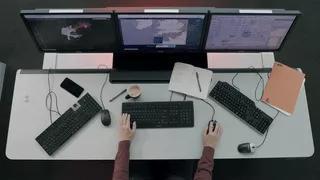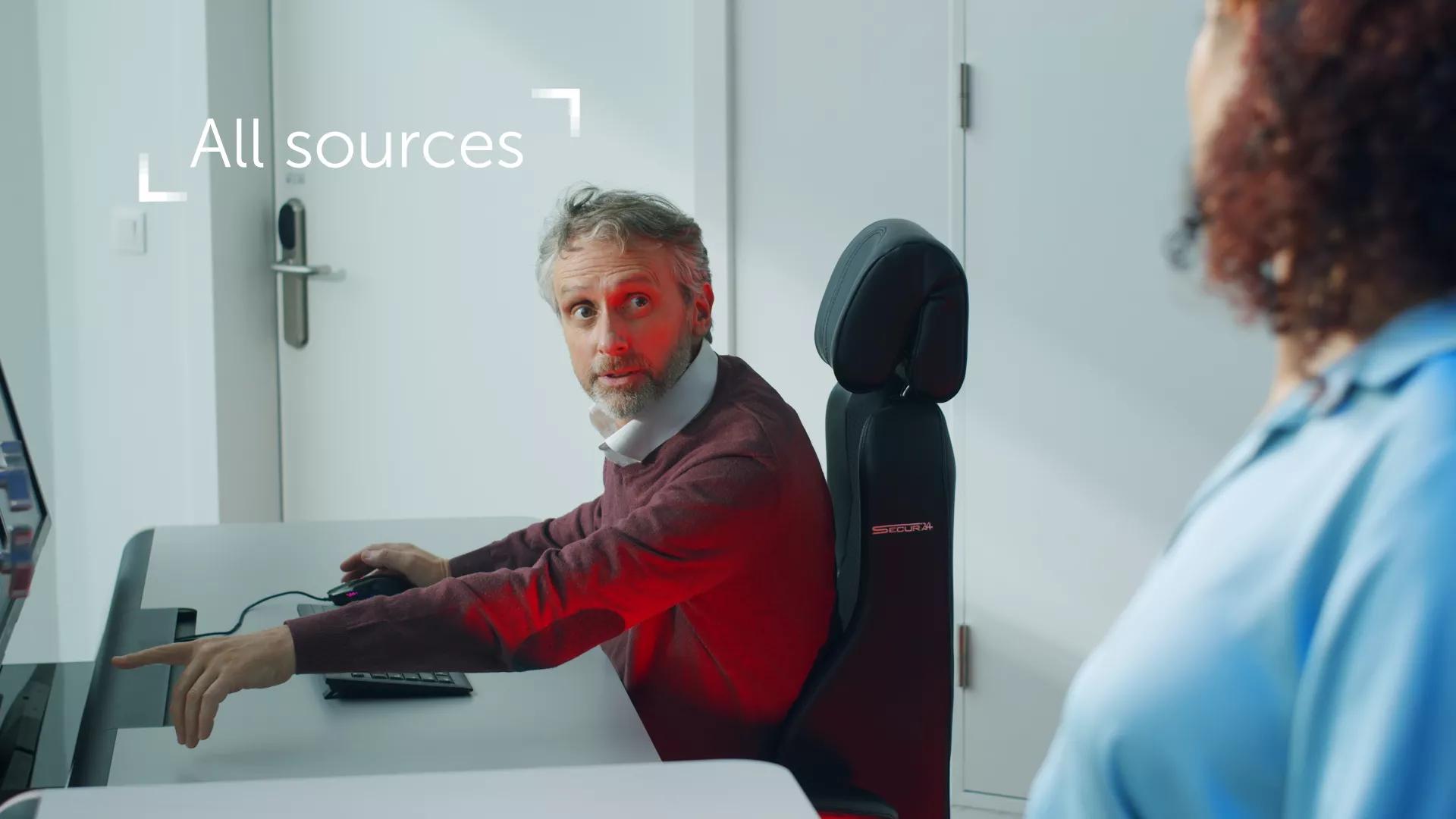Reducing visual clutter: from multiple monitors to one unified workspace
4분 읽기
Are you an office worker? Are you sitting in front of your computer screen right now? Then just have a quick look at the number of applications you have currently opened. You probably have opened a web browser, you may have an email program, and depending on your job, you may have opened different other applications, such as a word processor or a spreadsheet. Now imagine all these various applications are run by a different computer on your desk and displayed on a different computer screen. This may seem a bit far-fetched, but for a lot of control room operators, this is a daily reality.
Control room operators need to combine multiple content sources and applications to achieve complete situational awareness and to make well-founded decisions. The challenge is that these sources often come from multiple workstations on different networks that cannot be inter-connected and that the display of each workstation is often limited to one specific monitor only.
This creates an extremely uncomfortable position for the operator, because the more applications they are monitoring, the more workstations and monitors they will need. Sure, a KVM switch will allow them to switch between applications, but there still is little flexibility to organize applications, since each application is confined to a monitor.
Workspace ergonomics

Operators often find it difficult to navigate between monitors and information windows, especially when these monitors are in awkward positions. Contrary to what may be expected, too much information only reduces productivity and ultimately results in making slower or wrong decisions. On top of that, each monitored application will need to be run from a noisy, heat-generating PC close to the desk, which causes even more discomfort.
Luckily, there is a more ergonomic approach possible. The starting point here is the question ‘what content does the operator need to make a decision, and how is this content best presented to speed up decisions?’ It’s an approach that is much more focused on bringing the content to the operator in a user-friendly way, instead of making the operator search for the content in a stack of monitors.
The OpSpace Work Area
Barco OpSpace has been designed to meet these ergonomic concerns. OpSpace allows operators to compile their own display working area or pixel space, with the appropriate content sources or applications right in front of them, and with supporting information in the peripheral view. The strength of this approach is that operators can now choose to have content from any network, workstation or application in front of them with a mouse-click – content which used to be four monitors away or even two monitors up.
Obviously, this is a dynamic approach, because what operators need to have in front of them can change depending on the situation or task at hand. Handling a sudden incident may require different applications in their workspace than monitoring a smooth, uninterrupted process. With OpSpace, removing or adding applications in the Work Area is very easy.
The benefits of this approach cannot be underestimated:
- Operator health and comfort: Poor ergonomics is a major source of operator discomfort and health issues. Ergonomics experts typically recommend that monitors should not be farther than 35 degrees to the left or right [1]. With multiple monitors, operators risk straining their neck during their eight to twelve hours shifts of sedentary work. Solutions like OpSpace bring the content right in front of the operator, making the risk of neck injuries less likely.
- Attractive working environment: A healthy and modern workspace is a big advantage in the war for talent. As the control room workforce approaches retirement, younger generations of operators will have higher expectations from the attractiveness and general comfort of their workspace.
- Better decision-making: With information displayed many monitors away from their central view, operators risk missing critical information. This can lead to making the wrong decisions. By bringing the content to the pixel space in front of them, they have all the information at hand to make quick decisions.
Improving collaboration
A control room is the place par excellence for collaboration. In case of emergencies, operators often need to combine and share information to come to a collaborative decision. However, in times when social distancing guidelines need to be followed, and control rooms increasingly resort to remote, distributed locations, communication and collaboration between operators tends to become more complex. An operator-centered workspace like Barco OpSpace can facilitate this remote collaborative process, by bringing shared information in front of the operator with the click of a mouse.

For example, in normal operations, neighboring or remote operators may be looking at their own task-oriented view. But when an incident happens, they may need to switch to a new collaborative view in the blink of an eye. With Barco OpSpace, operators can bring any shared combination of sources and applications into the work area and immediately change from a ‘business-as-usual mode’ to an ‘incident mode’.
Healthy, comfortable, and productive
Operators do need to work with a multitude of different content sources, ranging from operational data, CCTV video, and overview graphs, to internet, and office applications. But instead of having operators search for their content on multiple monitors, the content can also be brought in front of the operator, which is a much more healthy, ergonomic, and productive way of organizing the operator workspace. It’s exactly the approach that Barco OpSpace is following.
[1] United States Department of Labor, Occupational Safety & Health Administration, https://www.osha.gov/SLTC/etools/computerworkstations/components_monitors.html
About the author

Jordan Heldrich
Segment Marketing Manager of Control Rooms
Jordan focuses on control rooms at Barco utilizing her multi-industry knowledge and experience in sales, product marketing and strategic marketing to bring dynamic strategies to control rooms. She is based in Atlanta, GA.

